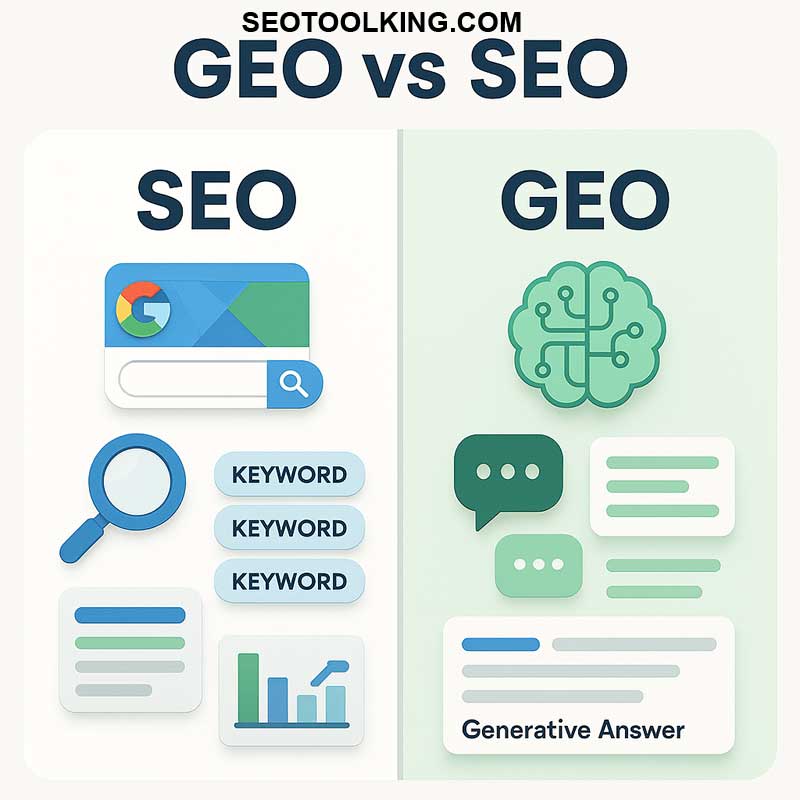GEO vs SEO: Understanding the Differences
The digital marketing landscape is evolving rapidly. With the rise of AI-driven search engines and generative models, businesses must understand the difference between traditional SEO (Search Engine Optimization) and the emerging discipline of GEO (Generative Engine Optimization).
At Small SEO Tool, we provide free SEO tools to help you optimize your content for both classic search engines and generative AI search—ensuring you stay visible today and tomorrow.
What Is SEO (Search Engine Optimization)?
SEO is the practice of optimizing websites to rank higher in search engine results pages (SERPs). It involves:
- Keyword research & targeting
- On-page optimization (titles, headings, metadata)
- Technical SEO (site speed, mobile optimization, indexing)
- Off-page SEO (backlinks, authority building)
- Content creation for relevance and engagement
👉 Run a free scan of your website with our SEO Analyzer Tool.

What Is GEO (Generative Engine Optimization)?
GEO (Generative Engine Optimization) is the process of making your content AI-friendly so that generative search engines (like Google SGE or ChatGPT-powered results) can understand, reference, and include it in their answers.
Key aspects of GEO include:
- Writing clear, factual, structured content
- Using conversational long-tail keywords
- Adding schema markup and structured data
- Ensuring trustworthiness and accuracy so AI cites your content
- Updating content frequently with verified insights
👉 Learn how to optimize AI-friendly content with our guide on LLM SEO Explained.
GEO vs SEO: Key Differences
| Factor | SEO (Search Engine Optimization) | GEO (Generative Engine Optimization) |
|---|---|---|
| Focus | Ranking on SERPs | Visibility in AI-generated answers |
| User Queries | Keyword-based searches | Conversational, natural language questions |
| Content Style | Keyword-rich & optimized | Factual, structured, AI-friendly |
| Ranking Signals | Backlinks, on-page, technical SEO | Authority, trust, structured data |
| Goal | Appear in search results | Be cited by AI engines as a source |
Both SEO and GEO complement each other: SEO ensures search visibility, while GEO prepares your content for the AI-first search future.
Why GEO Matters Alongside SEO
As AI-driven search becomes mainstream, GEO will:
- Increase your chances of being featured in AI-generated summaries
- Build brand authority by being cited as a trusted source
- Future-proof your content against shifts in how people search
- Complement your SEO efforts for a well-rounded digital strategy
👉 Start with our Keyword Research Tool to target conversational search queries.
How to Optimize for Both GEO and SEO
To stay competitive, you must blend GEO and SEO strategies.
1. Conduct Smart Keyword Research
- Use traditional keywords for SEO
- Target question-based, conversational keywords for GEO
2. Create Content for Humans & AI
- Provide direct, factual answers
- Structure posts with clear headings, bullet points, and schema
3. Build Trust and Authority
- Earn backlinks from high-authority sites
- Cite reputable sources
- Maintain E-E-A-T (Experience, Expertise, Authoritativeness, Trustworthiness)
4. Optimize Technical Aspects
- Improve site speed, mobile responsiveness, and crawlability
- Use schema markup to provide structured context
👉 Run a full Website SEO Audit with our SEO Audit Tool.
geo vs seo, generative engine optimization vs search engine optimization, difference between seo and geo, geo seo explained, ai friendly seo strategies, future of seo and geo, llm seo vs geo seo, optimize for generative search engines
Future of GEO and SEO in Digital Marketing
- SEO will remain essential for SERP rankings and organic visibility.
- GEO will grow rapidly as generative engines become a primary search interface.
- Businesses that adopt both strategies together will dominate in AI-first search environments.
FAQs
Q1: What does GEO mean in SEO?
GEO stands for Generative Engine Optimization, which focuses on optimizing content for AI-powered search engines.
Q2: Is GEO replacing SEO?
No, GEO is not replacing SEO. Instead, GEO complements SEO by making content visible in AI-generated answers, while SEO ensures SERP rankings.
Q3: How do I optimize for GEO?
Focus on structured, factual, conversational content with schema markup and authoritative references.
Q4: Should I focus more on SEO or GEO?
You should focus on both. SEO ensures visibility in current search results, while GEO future-proofs your content for AI-driven search.
Q5: What tools can help me with GEO and SEO?
You can use free tools like the SEO Analyzer, Keyword Research Tool, and Backlink Checker.



